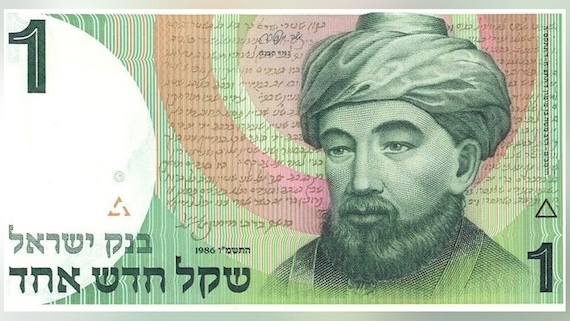
Never Forget: Jews and Muslims have Often imagined themselves in History as Siblings and Allies
Excerpted from Tingis.
The forgotten history of Jews and Muslims needs to be recovered in order to challenge a multitude of dangerous false assumptions that exacerbate the conflict between Israelis and Palestinians.
Historically, and even theologically, Jews have always been closer to Muslims than they were to Christians. It was in Muslim lands, the late eminent historian Bernard Lewis told us, that Arabic “became the language of science and philosophy, of government and commerce, even the language of Jewish theology when such a discipline began to develop under Islamic influence.” The Moroccan-Israeli historian Michel Abitbol couldn’t have been clearer: “The transformation of Judaism following its encounter with Islam affected all aspects of Jewish life profoundly and irreversibly.” The great scholar of Jewish thought Maimonides (whose face graces the Israeli sheqel as seen above), wrote his classic Guide to the Perplexed in Judeo-Arabic. It is common today to talk about a Judeo-Christian tradition to distance the West from Islam, but one can more appropriately talk about a Judeo-Muslim one.
Actually, similarities between Judaism and Islam made Jews targets in Christian Europe. “Why should we pursue the enemies of the Christian faith in far distant lands,” wrote Peter the Venerable of Cluny to Louis VII in 1146, “while vile blasphemers far worse than any Saracens, namely the Jews, who are not far away from us, but who live in our midst, blaspheme, abuse, and trample on Christ and the Christian sacraments so freely and insolently and with impunity!?”
After their expulsion from Spain in the fifteenth century, Jews were welcomed into the Ottoman Empire and other Muslim lands. A Frenchman by the name of Isaac Zarfati, deploring the treatment of Jews in Germany, encouraged his co-religionists to join him: “I proclaim to you,” he wrote, “that Turkey is a land wherein nothing is lacking, and where, if you will, all shall yet be well with you.”
Prominent nineteenth-century Jewish scholars from Germany and the Austro-Hungarian Empire such as Abraham Geiger, Heinrich Graetz, and Ignaz Goldziher who played a key role in developing what we now call Islamic Studies were convinced of the superiority of Islam to Christianity and felt a strong kinship with Muslims. The British Prime Minister Benjamin Disraeli, a descendant of Spanish Jews, was disdainful of European culture and proud of his Semitic ancestry. He called Jews the “Arabian tribe” and Arabs “Jews upon horseback.” In his novel Coningsby, or the New Generation, Disraeli wrote: “Why do these Saxon and Celtic societies persecute an Arabian race, from which they have adopted laws of sublime benevolence, and in the pages of whose literature they have found perpetual delight, instruction, and consolation?” For this reason, Jerusalem cannot be ruled by uncouth Europeans and “will ever remain,” he wrote in Tancred, or the New Crusade, “the appanage either of Israel or of Ishmael.”
Following their emancipation in Germany, Jews, eager to reclaim their Oriental heritage, used Moorish designs to build their synagogues because they offered the closest model they could imagine to the original Temple of Solomon. This led Orientalist scholar Paul de Lagarde to comment: “What is the sense of raising claims to be called an honorary German and yet building the holiest site that one possesses in Moorish style, so as to never ever let anyone forget that one is a Semite, an Asiatic, a foreigner?”
Still, Jews saw themselves as Orientals connected to Arabs and Muslims more so than they were to the alien traditions of their host European nations. As one writer put it in the monthly journal Jüdische Monatshefte: “Who is Ishmael to us? What does the Islamic world mean to us? The Muslim religious doctrine, customs and laws, the Muslim science and beautiful literature contain golden seeds which seem borrowed from us and the Jewish hereditary stock and thus seem familiar and related.” In fact, the association of Jews and Muslims persisted well into the Second World War when Nazis called the most degraded of their inmates in Auschwitz Muselmänner, or Muslims
The great Iraqi poet Ma’ruf al-Russafi wrote: “We are not, as our accusers say, enemies of the Children of Israel in secret or in public/How could we be, when they are our uncles, and the Arabs are kin to them of old through Ishmael?”
In 1948, King Abdullah of Transjordan told Golda Meir: “I believe with all my heart that divine providence has brought you back here [to Palestine and the Middle East], restoring you, a Semitic people who were exiled to Europe and shared in its progress, to the Semitic East which needs your knowledge and initiative. Only with your help and your guidance will the Semites be able to revive their ancient glory. We cannot expect genuine assistance from the Christian world, which looks down on Semitic people. We will progress only as the result of joint efforts.”
Just like Moroccan Jews in Israel and Muslim Moroccans are united by their love for their ancestral land, a better appreciation of the common heritage uniting Jews and Muslims could also help lessen tensions and establish a more durable foundation for peace.
Excerpted from Tingis with the author’s permission. Read the entire essay here .
No comments:
Post a Comment